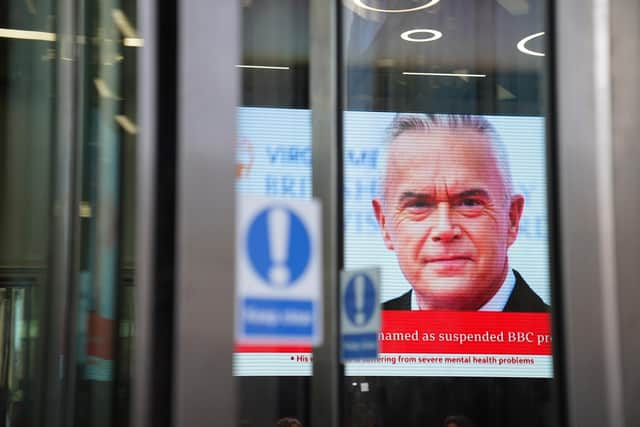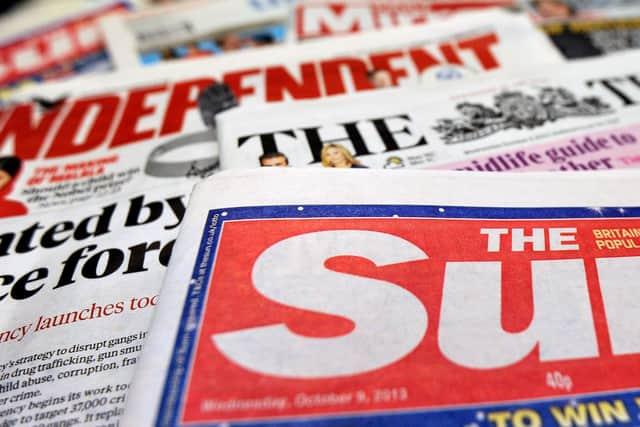BBC presenter: BBC and The Sun face questions as fallout from Huw Edwards story continues
It has been a complex, fast-moving story that has raised wide-ranging questions about trust, ethics, and public interest journalism, while also betraying the tensions between Britain’s foremost public service broadcaster and one of the country’s most powerful private media proprietors.
But at the end of a tumultuous week dominated by an ugly and frenzied social media guessing game and questions of who knew what, and when, what exactly has been gained? The reputations of two major news organisations have been dragged through the mud, careers have been potentially ruined, and families have been left shattered.
Advertisement
Hide AdAdvertisement
Hide AdIt is perhaps an understatement to suggest that in the long and storied history of British journalism, the Huw Edwards story will not be remembered as its finest hour. But it is in no way over. Far from it. There will be inquiries, parliamentary grillings, and follow-up articles to come. Not for the first time, the media itself, and the way it operates, has become the story.
There was scant sign of the tumult that would follow when The Sun ran its initial story last Saturday. ‘Top BBC star in sex pics probe’ the front page headline bellowed. In the brief story that followed, the presenter was not named – a sign of the stringent laws around privacy and defamation – and there was little in the way of evidenced detail, such as bank statements, to corroborate the central claim the corporation presenter had paid a young person for explicit photographs.
But it seemed like a classic tabloid investigation, and amid some of the more predictable partisan attacks from the BBC’s critics, such as Tory MP Lee Anderson, many in the media expected the name to emerge over coming days, whether it be via parliamentary privilege or another route.
The Sun continued to chip away, devoting extensive resources and newsprint to follow-ups to its story, as widespread speculation about the identity of the presenter continued to rage online. But come Wednesday, everything changed after the Metropolitan Police announced there was “no information to indicate that a criminal offence has been committed”.
Moments later, Mr Edwards’ wife Vicky Flind, issued a statement naming her husband as the BBC presenter at the centre of the allegations. She said she had done so “primarily out of concern for his mental well-being and to protect our children”, and that her husband was receiving treatment in hospital for “serious mental health issues”.


Later Wednesday evening, The Sun issued its own statement, announcing it had no plans to publish further allegations. But the key part of its statement came next. “We must also re-emphasise that The Sun at no point in our original story alleged criminality and also took the decision neither to name Mr Edwards nor the young person involved in the allegations,” it added. “Suggestions about possible criminality were first made at a later date by other media outlets, including the BBC.”
The choice of the phrase, ‘original story’, is significant. Many observers have questioned subsequent coverage by The Sun, including an article that ran in print and online last Sunday. The latter version of the story’s headline stated “BBC Sex Probe: Top BBC star who ‘paid child for sex pictures’ could be charged by cops and face years in prison, expert says.” The story quoted remarks given by Nazir Afzal, a former chief crown prosecutor, to The Sunday Times, a sister title of The Sun. In it, the paper reported Mr Afzal’s view the-then unnamed BBC presenter “could potentially be charged with sexual exploitation under the Sexual Offences Act 2003”.
On Monday, meanwhile, the print edition of The Sun carried another follow up reporting that initial contact had been made by the BBC with the Metropolitan Police. It carried the headline: “At Last, BBC Calls in the Cops.”
Advertisement
Hide AdAdvertisement
Hide AdThe next day, The Sun carried another report based on further interviews with the parents of the young person, stating the mother informed its journalists the presenter had “paid her child more than £35,000 for sordid images, starting when they were 17”. The report went on: “Under the Protection of Children Act, it is a criminal offence to make, distribute or possess an indecent image of anyone under 18.”


On late Tuesday online, and in the following day’s print edition, The Sun ran a full-blooded editorial that insisted it was “beyond dispute” that its story about the BBC presenter was in the public interest.
“Here was a powerful household name, handsomely salaried via the licence fee, allegedly paying £35,000 to a vulnerable young person with a history of drug use who was sending him sexual pictures,” it stated. “That alleged abuse of power is central to this scandal. It is important not to lose sight of it – and the parents’ very real fears for the damage done to their child – amid all the furore about whether the law was broken.
“Also crucial to the public interest is the BBC’s woefully perfunctory handling of the family’s detailed original complaint, as set out in the corporation’s own timeline.”
Another lengthy editorial that ran in Friday’s print edition of The Sun reiterated the paper’s stance and carefully attempted to shift the narrative away from Mr Edwards and towards the young person’s parents, whom, the article insisted, “felt helpless and without a voice”. It added: “We provided them with one.”
The editorial continued: “We stand by our story and the voice it gave to two worried parents. But the BBC, frantically circling the wagon around its top news presenter, has tried to remould it to attack The Sun.” In a sign of the growing antagonism between the two news providers, the same edition included a feature entitled, ‘10 questions the BBC needs to answer’.
But what of The Sun? Despite its editorial justifications, it is facing serious questions about its reporting. The press regulator, the Independent Press Standards Organisation, has received upwards of 80 complaints concerning the paper’s coverage, and the issue of whether its stories were in the public interest, or merely of interest to the public, will come under intense scrutiny.
The fact that police ruled there was no criminality involved is a marked blow to any public interest defence, especially if it is decided that alleged criminality was a factor in The Sun’s decision to publish the claims.
Advertisement
Hide AdAdvertisement
Hide AdFor that reason, the wording of its stories is significant, especially when set against The Sun’s insistence that it did not allege criminality in its original story. The initial front page article last Saturday began: “A top BBC star is off air while allegations he paid a teenager for sexual pictures are being investigated. The well-known presenter is accused of giving the teen more than £35,000 since they were 17 in return for sordid images.” In a later report, however, the details of the allegations were slightly different, with the title noting “it is understood contact between the two started when the youngster was 17 years old”.
But there are even more serious questions facing the Rupert Murdoch-owned title, not least the dismissal of The Sun’s story as “rubbish” by a lawyer for the young person alleged to have received the payments, who insisted “nothing inappropriate or unlawful has taken place”.
According to the BBC, the lawyer said the young person sent a message on WhatsApp to the paper on Friday evening – crucially, before the story’s publication – denying the claims, saying the statement their mother made to the newspaper was "totally wrong and there was no truth to it”. Such claims, however, were not present in The Sun’s initial story. It remains unclear whether the newspaper had made any direct contact with the young person, or had attempted to do so.
In the wake of that statement, the campaign group, Hacked Off, was among those to issue stern criticism of The Sun’s journalism. “If the claims of this young person’s lawyer are true, they indicate that the Sun failed to follow even the most basic journalistic standards in pursuit of this story,” it said.
David Yelland, who edited The Sun between 1998 and 2003, also questioned his former employer’s decision making. “The Sun inflicted terror on Huw despite no evidence of any criminal offence,” he tweeted. “This is no longer a BBC crisis, it is a crisis for the paper.”
Such questions facing The Sun may or may not be answered, but regardless, the story will continue to play out. A key reason for that is there is the public interest case in how the BBC handled the initial complaint – specifically whether an email and a single attempted phone call were good enough in its attempts to verify the claims – as well as the subsequent fallout.
Indeed, the BBC has since reported that some of its staff had also made claims about inappropriate messages by Mr Edwards. Given how such allegations raise pertinent questions around potential abuses of power, there will be considerable interest inside and outside the BBC to the answers to questions around when those claims first arose, and what steps were taken to address them.
It has been reported that some journalists on the BBC’s flagship Newsnight programme were looking into issues about Mr Edwards conduct before The Sun ran in its first story. That may be the case, but it does not necessarily corroborate the public interest defence being advanced by The Sun, nor does it absolve the BBC from its wider human resources obligations.
Advertisement
Hide AdAdvertisement
Hide AdFor all that such reporting may be held up as proof of the BBC’s determination to report transparently on its own affairs without fear or favour, and ensure the mistakes of the past, such as the Savile scandal, are not repeated, its stories about Mr Edwards have also been questioned by several high-profile journalists, many of whom occupied senior roles at the corporation.
Emily Maitlis, the former lead anchor for Newsnight, said while it was important to have “Chinese walls” separating the BBC’s newsgathering operation and its management, there were “distasteful” elements to its reporting. “If you know this stuff about a colleague, why isn't your first duty to then go to HR?” she asked on her News Agents podcast. “Or to go to a senior manager or to say ‘I think this is going on’ rather than to turn it into a news story."
Former BBC executive and presenter Roger Bolton told The Guardian: “We have learned that BBC News has done an admirable job in scrutinising its own organisation, but has become almost obsessive about the story, giving it greater prominence than it should have.”
While the BBC continues its internal investigation into Mr Edwards, its embattled director-general, Tim Davie, will appear before the Lords communication committee on Tuesday alongside Dame Elan Closs Stephens, the acting BBC chair, and Clare Sumner, the corporation’s policy director. The committee has said peers will raise a range of issues, including “in light of recent events, what concerns have been raised about the adequacy of the BBC's governance arrangements and how it is addressing these”.
The ongoing probe may allow Mr Davie and his colleagues a degree of leeway in declining to address specific issues, but the questions will continue to mount. A story that has already undergone countless twists and turns has plenty of miles left in it yet.
Comments
Want to join the conversation? Please or to comment on this article.